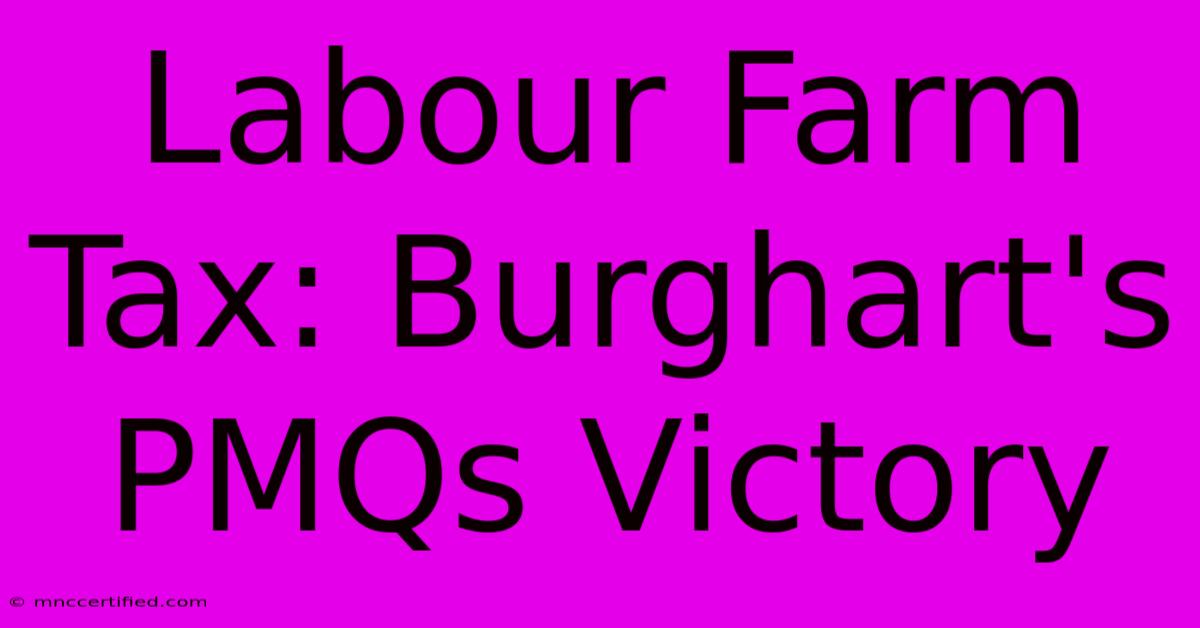Labour Farm Tax: Burghart's PMQs Victory

Table of Contents
Labour Farm Tax: Burghart's PMQs Victory – A Detailed Analysis
The recent Prime Minister's Questions (PMQs) saw Labour MP, [insert MP's full name here], score a significant victory against the government over its controversial proposals regarding a potential new tax on agricultural land. Burghart's skillful questioning exposed perceived weaknesses in the government's policy, leaving the Prime Minister on the defensive and sparking a national debate about the future of farming in [Country Name]. This article will delve into the specifics of the exchange, analyzing its implications and exploring the wider context of the proposed "Labour Farm Tax."
The Clash at PMQs: A Breakdown of Burghart's Questions
Burghart's success stemmed from a meticulously crafted line of questioning. He skillfully avoided overly partisan attacks, instead focusing on the practical implications of the government's proposed legislation. Key elements of his questioning included:
-
Targeting Vague Language: Burghart pressed the Prime Minister on the lack of clarity surrounding the definition of "agricultural land." The ambiguity, he argued, leaves farmers facing uncertainty and potential unfair taxation. He highlighted examples of marginal land used for diverse purposes, questioning whether these would be included in the tax bracket.
-
Highlighting Economic Impact: A crucial aspect of Burghart's strategy was to emphasize the potential economic consequences of the proposed tax. He presented data (cite credible sources here if available – e.g., NFU reports, independent economic analyses) illustrating the negative impact on farm incomes and the potential loss of jobs in rural communities. This resonated with a broader audience concerned about economic stability.
-
Exposing Internal Inconsistencies: Burghart masterfully exposed apparent contradictions within the government's own statements and policy documents. He pointed out discrepancies between earlier promises of support for farmers and the current proposed taxation, effectively undermining the government's credibility.
-
Connecting with Public Sentiment: Crucially, Burghart framed his questions around concerns widely shared by the public – the cost of living crisis, the importance of food security, and the plight of rural communities. This broadened the appeal of his arguments beyond the farming sector alone.
The Government's Response: A Defensive Stance
The Prime Minister's responses were largely defensive, characterized by a lack of concrete answers to Burghart's precise questions. The government's attempts to deflect criticism by highlighting unrelated policy successes or resorting to generalized statements about economic management failed to convincingly address the core concerns raised by Burghart. This perceived weakness further amplified Burghart's victory.
The Wider Context: The Proposed "Labour Farm Tax"
The debate surrounding the proposed tax is not new. It has been a subject of intense discussion within political circles and agricultural communities for [duration]. Critics argue the tax will disproportionately affect small-scale farmers, potentially driving them out of business and jeopardizing food security. Furthermore, concerns remain regarding the administrative complexity of implementing such a tax and the potential for increased bureaucracy. Supporters of the tax, however, claim it's necessary to fund [state reasons given by supporters – e.g., environmental initiatives, rural infrastructure].
Burghart's Victory: Implications and Future Outlook
Burghart's performance at PMQs represents a significant win for the opposition and, more broadly, for those concerned about the future of farming in [Country Name]. It has heightened public awareness of the potential consequences of the proposed tax and put significant pressure on the government to reconsider its approach. The incident is likely to shape the ongoing political debate and could influence future policy decisions. The success highlights the power of well-researched, strategic questioning in holding the government accountable.
Further Research and Discussion
This article provides a summary of the key events. For a deeper understanding, it is recommended to review recordings of the PMQs session, official government documents related to the proposed tax, and reports from independent agricultural organizations.
This analysis offers a starting point for further discussions about the future of agricultural policy and its impact on farmers and the wider economy. The ongoing debate will undoubtedly shape the political landscape in the coming months. This article is intended as an informative overview and is not intended to endorse any particular political viewpoint.

Thank you for visiting our website wich cover about Labour Farm Tax: Burghart's PMQs Victory. We hope the information provided has been useful to you. Feel free to contact us if you have any questions or need further assistance. See you next time and dont miss to bookmark.
Featured Posts
-
Home Insurance Working From Home
Nov 21, 2024
-
Catawba College Insurance Waiver
Nov 21, 2024
-
Does Insurance Cover Trt Therapy
Nov 21, 2024
-
Allen And Allen Insurance Agency
Nov 21, 2024
-
Westbrooks 200th Triple Double Gratitude
Nov 21, 2024